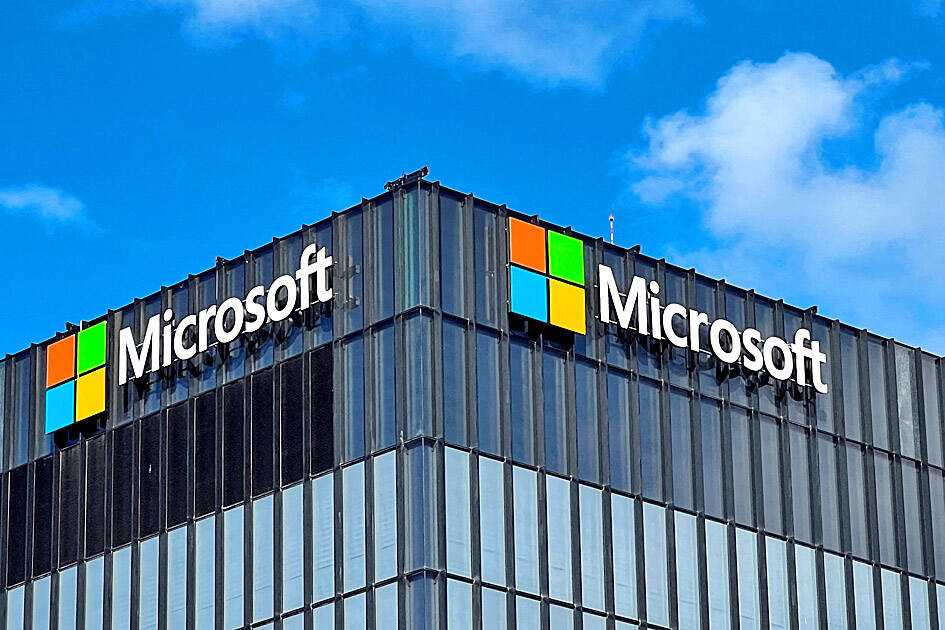Microsoft Corp is working with Advanced Micro Devices Inc (AMD) on the chipmaker’s expansion into artificial intelligence (AI) processors, people with knowledge of the situation said.
The cooperation is part of a multipronged strategy to secure more of the highly coveted components, they said.
The companies are teaming up to offer an alternative to Nvidia Corp, which dominates the market for AI-capable chips called graphics processing units, said the people, who asked not to be identified because the matter is private.

Photo: REUTERS
The software giant is providing support to bolster AMD’s efforts, including engineering resources and working with the chipmaker on a homegrown Microsoft processor for AI workloads, code-named Athena, the people said.
Microsoft spokesman Frank Shaw denied that AMD is part of the Athena project.
“AMD is a great partner,” he said. “However, they are not involved in Athena.”
The arrangement is part of a broader rush to augment AI processing power, which is in great demand after the explosion of chatbots such as ChatGPT and other services based on the technology. Microsoft is a top provider of cloud-computing services and a driving force of AI use. The company has pumped US$10 billion into ChatGPT maker OpenAI, and has vowed to add such features to its entire software lineup.
The move also reflects Microsoft’s deepening involvement in the chip industry. The company has been building up a silicon division over the past several years under former Intel Corp vice president Rani Borkar, and the group now has a staff of almost 1,000 employees.
Tech news Web site The Information last month reported on Microsoft’s development of the Athena AI chip.
Several hundred of those employees are working on the Athena project, and Microsoft has spent about US$2 billion on its chip efforts, one of the people said.
However, the undertaking does not portend a split with Nvidia. Microsoft intends to keep working closely with Nvidia, whose chips are the workhorses for training and running AI systems.
It is also trying to find ways to get more Nvidia processors, underscoring the urgent shortage Microsoft and others are facing.
Microsoft’s relationship with OpenAI — and its own slate of newly introduced AI services — are requiring computing power at a level beyond what the company expected when it ordered chips and set up data centers.
OpenAI’s ChatGPT service has drawn interest from businesses that want to use it as part of their own products or corporate applications, and Microsoft has introduced a chat-based version of Bing and new AI-enhanced Office tools.
It is also updating older products such as GitHub’s code-generating tool. All of those AI programs run in Microsoft’s Azure cloud and require the pricey and powerful processors Nvidia provides.
The area is also a key priority for AMD.
“We are very excited about our opportunity in AI — this is our No. 1 strategic priority,” AMD chief executive officer Lisa Su (蘇姿丰) said during the chipmaker’s earnings call on Tuesday. “We are in the very early stages of the AI computing era, and the rate of adoption and growth is faster than any other technology in recent history.”

Semiconductor business between Taiwan and the US is a “win-win” model for both sides given the high level of complementarity, the government said yesterday responding to tariff threats from US President Donald Trump. Home to the world’s largest contract chipmaker, Taiwan Semiconductor Manufacturing Co (TSMC, 台積電), Taiwan is a key link in the global technology supply chain for companies such as Apple Inc and Nvidia Corp. Trump said on Monday he plans to impose tariffs on imported chips, pharmaceuticals and steel in an effort to get the producers to make them in the US. “Taiwan and the US semiconductor and other technology industries

The US Federal Reserve is expected to announce a pause in rate cuts on Wednesday, as policymakers look to continue tackling inflation under close and vocal scrutiny from US President Donald Trump. The Fed cut its key lending rate by a full percentage point in the final four months of last year and indicated it would move more cautiously going forward amid an uptick in inflation away from its long-term target of 2 percent. “I think they will do nothing, and I think they should do nothing,” Federal Reserve Bank of St Louis former president Jim Bullard said. “I think the

SMALL AND EFFICIENT: The Chinese AI app’s initial success has spurred worries in the US that its tech giants’ massive AI spending needs re-evaluation, a market strategist said Chinese artificial intelligence (AI) start-up DeepSeek’s (深度求索) eponymous AI assistant rocketed to the top of Apple Inc’s iPhone download charts, stirring doubts in Silicon Valley about the strength of the US’ technological dominance. The app’s underlying AI model is widely seen as competitive with OpenAI and Meta Platforms Inc’s latest. Its claim that it cost much less to train and develop triggered share moves across Asia’s supply chain. Chinese tech firms linked to DeepSeek, such as Iflytek Co (科大訊飛), surged yesterday, while chipmaking tool makers like Advantest Corp slumped on the potential threat to demand for Nvidia Corp’s AI accelerators. US stock

Cryptocurrencies gave a lukewarm reception to US President Donald Trump’s first policy moves on digital assets, notching small gains after he commissioned a report on regulation and a crypto reserve. Bitcoin has been broadly steady since Trump took office on Monday and was trading at about US$105,000 yesterday as some of the euphoria around a hoped-for revolution in cryptocurrency regulation ebbed. Smaller cryptocurrency ether has likewise had a fairly steady week, although was up 5 percent in the Asia day to US$3,420. Bitcoin had been one of the most spectacular “Trump trades” in financial markets, gaining 50 percent to break above US$100,000 and